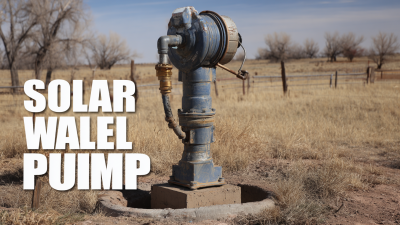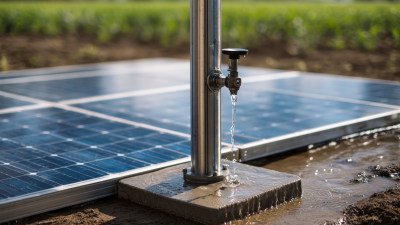Unlocking the Advantages of Surface Water Pumps for Efficient Water Management
In the ever-evolving landscape of water management, the importance of efficient pumping systems cannot be overstated.
 Surface water pumps, which are designed to draw water from rivers, lakes, and reservoirs, have gained significant attention due to their versatility and effectiveness in various applications.
According to recent industry reports, the global market for surface water pumps is projected to reach USD 22.5 billion by 2027, demonstrating a compound annual growth rate (CAGR) of 5.3% from 2020.
This growth is driven by the increasing demand for irrigation, municipal water supply, and wastewater management solutions.
With advancements in technology and design, surface water pumps offer enhanced efficiency and reliability, making them essential for sustainable water resource management.
Understanding the advantages of these pumps allows stakeholders to make informed decisions, ultimately leading to improved operational efficiency and reduced environmental impact.
Surface water pumps, which are designed to draw water from rivers, lakes, and reservoirs, have gained significant attention due to their versatility and effectiveness in various applications.
According to recent industry reports, the global market for surface water pumps is projected to reach USD 22.5 billion by 2027, demonstrating a compound annual growth rate (CAGR) of 5.3% from 2020.
This growth is driven by the increasing demand for irrigation, municipal water supply, and wastewater management solutions.
With advancements in technology and design, surface water pumps offer enhanced efficiency and reliability, making them essential for sustainable water resource management.
Understanding the advantages of these pumps allows stakeholders to make informed decisions, ultimately leading to improved operational efficiency and reduced environmental impact.
Understanding Surface Water Pumps and Their Functionality
Understanding surface water pumps is crucial for effective water management, especially in various agricultural and industrial applications. These pumps are designed to draw water from surface sources like rivers, lakes, and reservoirs, making them a vital tool in areas where groundwater levels are decreasing. For instance, recent studies have highlighted the interconnection between surface water and groundwater, emphasizing the need to manage these resources sustainably. The annual resets of hydrogeological systems in cold and humid climates reveal essential insights into how surface water can serve as a buffer against groundwater depletion caused by extensive pumping.
In the context of increasing agricultural demands and climate variability, selecting the right surface water pump is imperative. Farmers must consider factors such as flow rates and durability to ensure efficient irrigation, particularly in regions experiencing groundwater over-pumping and subsidence. As research continues to explore the impacts of climate on groundwater resources, understanding the functionality and advantages of surface water pumps will play a critical role in promoting sustainable practices and ensuring sufficient water supply for future generations.

Key Benefits of Using Surface Water Pumps for Water Management
Surface water pumps play a crucial role in efficient water management, offering several key benefits that enhance the effectiveness of water usage across various sectors. According to a report from the International Water Management Institute, approximately 70% of fresh water is used for agricultural purposes, and surface water pumps can significantly optimize irrigation processes, ensuring that crops receive consistent and adequate water supply. This technology not only increases crop yield but also reduces water waste; by employing advanced hydraulic principles, surface water pumps can achieve efficiency rates of up to 85%, compared to traditional methods which often fall short.
In the context of urban water supply and flood control, surface water pumps serve as a vital infrastructure component. A study by the World Bank highlights that effective surface water management can decrease the incidence of flooding by as much as 30% in urban areas. By efficiently redirecting water during heavy rainfall, these pumps minimize the risk of property damage and protect essential services. Moreover, they facilitate the harvesting of rainwater, promoting sustainable practices that can reduce dependency on groundwater sources, whose depletion has reached alarming levels in many regions, as reported by the United Nations. Thus, the strategic implementation of surface water pumps not only addresses immediate water management needs but also contributes to long-term environmental sustainability.

Efficient Installation Tips for Surface Water Pumps
When it comes to effectively managing water resources, proper installation of surface water pumps is crucial. Start by assessing the specific requirements of your site. Factors such as the pump's capacity, required flow rate, and the landscape's topography will significantly influence your installation process.
Carefully measuring the distance from the water source to the pump can help in selecting the appropriate piping and prevent potential pressure losses. Always ensure that the installation area is stable and cleared of any obstructions to facilitate smooth operations.
Another essential tip is to use high-quality materials that enhance durability and efficiency. Invest in corrosion-resistant pipes and fittings to withstand varying environmental conditions.
Furthermore, consider the pump’s power source; whether it’s electric or diesel, proper electrical connections and adequate fuel storage will ensure seamless functionality.
Lastly, regularly inspect the system post-installation to identify any maintenance needs immediately, which can prolong the pump’s lifespan and optimize its efficiency.
By following these tips, you can ensure that your surface water pump operates smoothly and effectively, leading to better water management.
Maintenance Best Practices for Longevity of Surface Water Pumps
Maintaining surface water pumps is crucial for ensuring their efficiency and longevity. One of the most important best practices is regular inspection and cleaning. Pump components should be checked for debris, corrosion, or wear that could impede performance. Schedule routine cleanings to remove any accumulated sediment that can clog filters or reduce flow rates. This not only helps in extending the lifespan of the pump but also enhances its operational efficiency.
Additionally, proper lubrication and timely replacement of worn-out parts are essential maintenance practices. Use manufacturer-recommended lubricants to keep moving parts functioning smoothly, and establish a schedule for replacing seals and gaskets that can wear out over time. Monitoring performance indicators like pressure and flow rates can also alert you to potential issues early on, allowing for corrective action before major failures occur. With these simple yet effective maintenance strategies, surface water pumps can operate reliably and efficiently for years to come.
Unlocking the Advantages of Surface Water Pumps for Efficient Water Management
This chart illustrates the efficiency of surface water pumps over different maintenance practices, highlighting how regular maintenance can lead to significant performance improvements.
Optimal Applications of Surface Water Pumps in Various Industries
Surface water pumps are vital for efficient water management across various industries, playing a crucial role in agricultural, industrial, and municipal applications. According to the Water Research Foundation, nearly 40% of water used in agriculture comes from surface sources, highlighting the necessity for effective pumping solutions. These pumps are designed to handle large volumes of water, making them ideal for irrigation systems and flood control efforts, where rapid water removal is essential.
Tip: When selecting a surface water pump, consider the pump's flow rate and total dynamic head (TDH). These factors are essential for ensuring the pump meets the specific demands of your application.
In the industrial sector, the demand for surface water pumps has surged, with a projected market growth rate of 5.6% annually, as reported by Global Industry Analysts. Industries such as mining and construction utilize these pumps for dewatering and material transfer, improving operational efficiency and safety. Furthermore, the versatility of surface water pumps allows them to adapt to various conditions, making them suitable for both temporary and permanent installations.
Tip: Regular maintenance is key to extending the lifespan of surface water pumps. Schedule periodic inspections to prevent unexpected breakdowns and ensure optimal performance.
Unlocking the Advantages of Surface Water Pumps for Efficient Water Management - Optimal Applications of Surface Water Pumps in Various Industries
| Industry | Application | Pump Type | Advantages | Efficiency Rating |
|---|---|---|---|---|
| Agriculture | Irrigation | Centrifugal Pump | High flow rate, low energy consumption | 85% |
| Construction | Site Dewatering | Submersible Pump | Portable, effective in deep water | 90% |
| Mining | Water Removal | Diaphragm Pump | Handles viscous liquids | 78% |
| Municipal | Stormwater Management | Vertical Turbine Pump | Space-efficient, reliable | 88% |
| Industrial | Cooling Systems | End Suction Pump | Efficient thermal exchange | 87% |
Related Posts
-

5 Innovative Reasons Why Solar Submersible Pumps Are Revolutionizing Water Management in 2023
-

Navigating Import Export Certifications for the Best Solar Energy Products Worldwide
-

The Ultimate Guide to Choosing the Best Solar Well Pump for Efficient Water Management
-

Innovative Approaches to Optimize Your Solar Solutions
-

Ultimate Checklist for Choosing the Best Solar Systems: Key Metrics and Expert Insights
-

Unlock the Power of Best Solar Powered Water Pumps Understanding Technical Specs and Installation Guide
Contact Details
Address:
Solar Pump Solutions,
Borrisokane, Co. Tipperary, Ireland.
